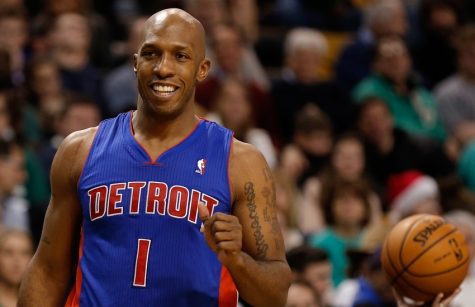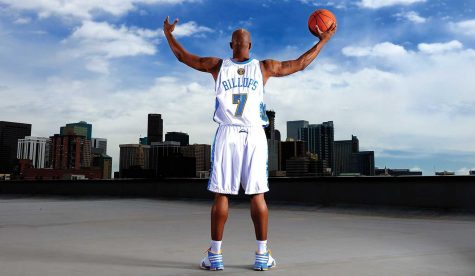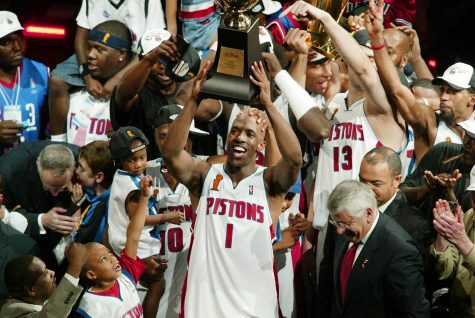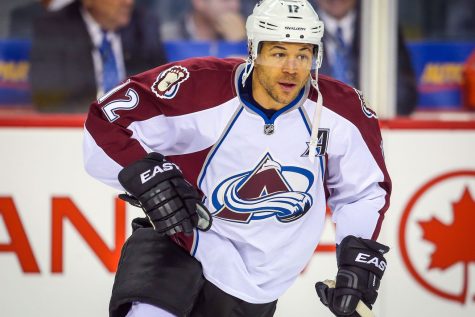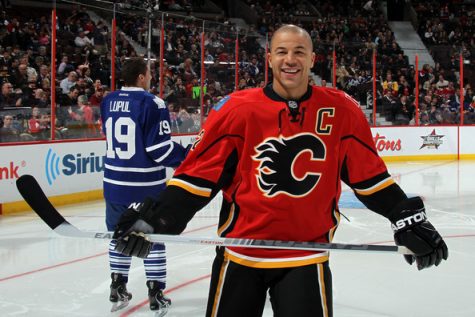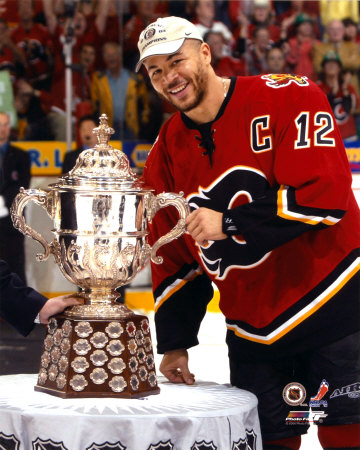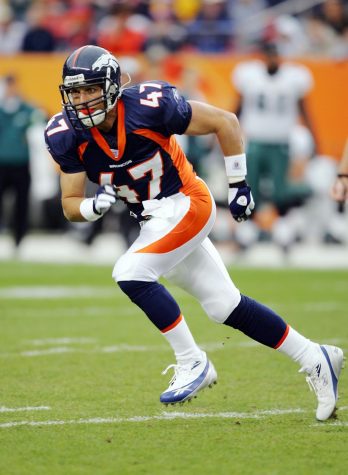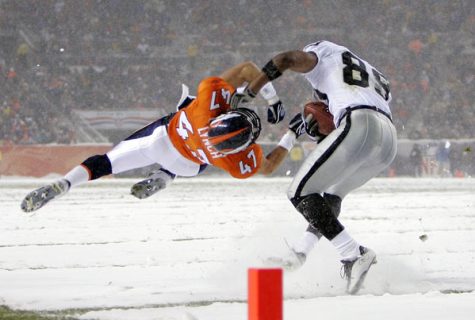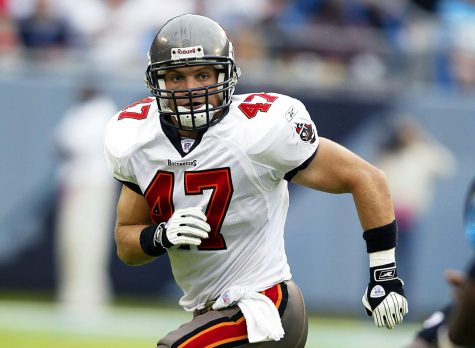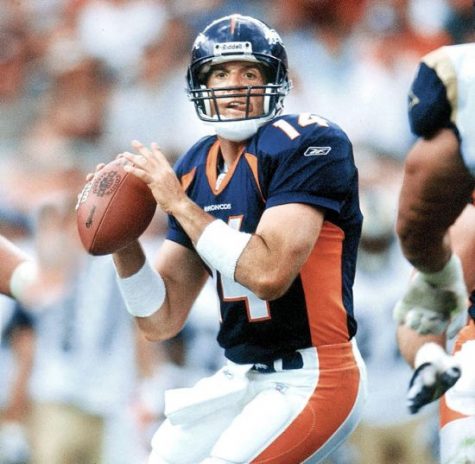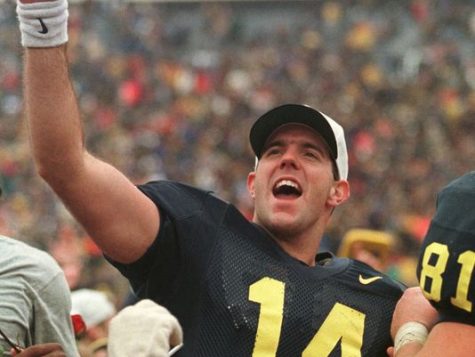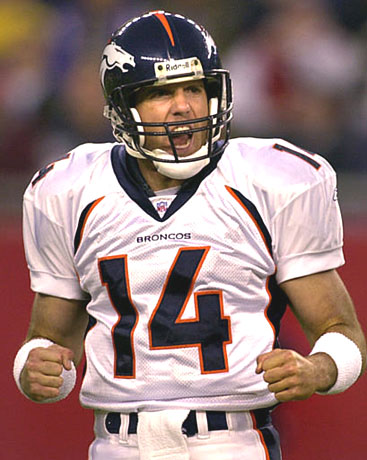Life Before, During, and After the Game
December 14, 2016
Athletes go through many challenges while getting to the level to play professionally, but these athletes have to overcome many difficulties they face, and make it to the top level. I was extremely fortunate to have the incredible honor to interview four of the nation’s top current and former sporting legends. Here are their stories.
Chauncey Billups
Chauncey Billups is a former NBA player who played for 7 teams in his pro career. He was an Olympian for the US national team, but he is most notably known for winning the NBA championship in 2004 with the Detroit Pistons. He was named Finals MVP that year, and led his team to victory. He had an incredible 17 year career.
Source: NBA
Q and A Interview
Daniel Carr: When did you first start playing your pro sport? What age did you realize you could play professionally?
Chauncey Billups: I first started playing basketball when I was 10 years old. Actually, football was my first sport, I actually started playing football when I was 6 or 7. Then I started playing basketball when I was 10. I realized I could play professionally when I was a senior in high school, when I felt like it was a possibility to be a pro. I played in All-American basketball camps and played against guys a couple of years before they went pro. I felt like I was on that level. Obviously, some of those guys I had more potential than, but that is when I knew.
DC: How heavily were you scouted?
CB: Yeah, I was one of the top high school players in the country. The schools that scouted me were: Kansas, UCLA, Arizona, Michigan, and Georgia Tech. But, I ended up going to Colorado.
DC: What was the first pro team you played for?
CB: I was drafted by the Boston Celtics in 1997. I also played for the Toronto Raptors, the Denver Nuggets twice, the Minnesota Timberwolves, the Detroit Pistons, the New York Knicks, and the LA Clippers. Detroit was my favorite for sure because we won a championship.
DC: What was the most enjoyable thing about being a professional athlete?
CB: I would say the best part about it was being able to compete against the best players in the world. The fact that you are playing a sport that you are getting paid for, and you would do it for free. I grew up playing for free all my life, and all of sudden you are playing and you are getting paid to do it.
DC: What was the toughest thing about being a professional athlete?
CB: The toughest thing for me was being married and being a father. You miss so many things. Whether it is school events, sporting events, very important things that you cannot get back is a huge sacrifice. You’re away so much when you travel.
DC: What is the best experience you had in your pro career? Why was this the best experience?
CB: The best experience I ever had was in 2004 winning the NBA championship with the Detroit Pistons against the Lakers. It was the best because, I mean, that is what you play for. You play to win a championship. I always felt like I could lead my team, so it was kind of validation for me that I could finally get there and finally get over the hump.
DC: What is the worst injury you had in your pro sport?
CB: I had quite a few injuries, but the toughest one I had was when I tore my achilles, but luckily, it was towards the end of my career. So I tore it and I was out a whole year, but I was able to come back and play two more years. Then I ended up retiring.
DC: Who was your favorite teammate of all time? Why was he your favorite teammate?
CB: My favorite teammate was probably Kevin Garnett. He was my favorite teammate because of his approach to the game, and he was always extremely serious and competitive. Every practice, every shoot around, every game. He would always play to win, every single day. He was unselfish, and he was probably the most talented player I ever played with.
DC: What was the hardest part about retiring from your pro sport?
CB: The hardest part about retiring was probably knowing you are going to miss playing. While I don’t miss playing because I gave it all I had, but the biggest thing you miss is the guys, the locker room, and the camaraderie. The guys you get to laugh with, and you get to compete with a group of guys year in and year out. That is probably the toughest thing about retiring. But, I don’t miss it at all, because I gave it all I had.
What have you done after your pro career? How important is it for your to stay connected with the game?
CB: I just feel like, you know, my presence is needed in the game at some capacity. Right now, I’m working as an NBA analyst on ESPN, just trying to share my knowledge of the game every week on a live NBA Countdown show. That is the way I try and stay connected with the game. I have been actually even more busy now than when I was actually playing.
What piece of advice do you have for young athletes aspiring to be like you?
CB: You know, I was going to say just to be dedicated. Give everything you have into it. Athletes, you only do it for so long. I was lucky to do it for 17 years. But, being able to do it 5 or 6 is probably an average. So, you have to give everything you have into it. You have to work extremely hard, put your mind, body and soul into it knowing that you are going to have to sacrifice a lot of things, but if that’s what you want to do, it will be worth it. But, you have to work your mind off man! Never let anybody outwork you.
Jarome Iginla
Jarome Iginla is a current NHL player for the Colorado Avalanche. He has played 20 years in the NHL, and has played for 4 NHL teams. He is a 6-time NHL All-Star, and a Calgary Flames legend. He is a gold medalist with the Canadian national team, and has had an exceptional career so far.
Source: NHL
Q and A Interview
Daniel Carr: When did you first start playing your pro sport? What age did you realize you could play professionally?
Jarome Iginla: I started playing in Canada, in Edmonton. When I started in Canada at age 10, that was a bit late. Most kids start probably around 5 so I was a little bit behind when I started. So I started at a bottom league, and I would play all the time with my grandparents. They had a rink and a goal. We would go to the rink all the time. I always dreamed that I could play professional hockey ever since I was 7 or 8 years old. I watched NHL games and I dreamed one day that I could I be in the NHL. But I would probably say around 15 years old. At age 16, I played in a junior league, which is very similar to a semi professional league. You are trying to get drafted and instead of playing in front of 100 people you are playing in front of 5,000 people. It was much more of a pro style culture. If I wanted to play professionally, I had to move to British Columbia. It was an 8 hour drive, and that was when I really decided I was going to go for it and make it. If I didn’t know I was going to make it, I probably would never have left.
DC: How heavily were you scouted?
JI: Well, there are different routes to play in the NHL. Some people go to college. In Canada, we call it major junior. That is a little bit different. I never went to college, I played in the NHL after high school. I was a first round draft pick into the NHL, but to go to the major juniors, I wasn’t that high a pick. They had a draft and I wasn’t drafted in that initial draft. I wasn’t that heavily scouted going into that league.
DC: What was the first pro team you played for?
JI: The first pro team I played for was the Calgary Flames but I got drafted into the NHL in 1995 to the Dallas Stars. I got drafted that July of 1995, and that Christmas I got traded my rights to the Calgary Flames. They were the first team I actually played a game with. I also played for the Pittsburg Penguins, Boston Bruins, and then the Colorado Avalanche.
DC: What was the most enjoyable thing about being a professional athlete?
JI: Well that’s a very hard question because there are lots of very enjoyable things. It’s a neat job. I thought it would be a great job and it has been everything and more. It’s fun to play a game, very very blessed to play a game. You make a very good living playing a game, and I enjoyed the camaraderie and the travel. It’s like you’re a kid on the rink again. You are playing a game and it is fun. Even our worst days at the job, it’s like being a kid again. You had fun playing, but it sucks when you lose. It is still fun to play and you get to see lots of North American cities. Just to compete and play in the NHL is very enjoyable.
DC: What was the toughest thing about being a professional athlete?
JI: The toughest thing about being a professional athlete is losing. It’s just a game, but that’s our business: to win. The pressure the coach puts on you, and to be successful as a team. Losing, for sure, is tough because that means we didn’t succeed.
Source: NHL
DC: What is the best experience you had in your pro career? Why was this the best experience?
JI: I’ve been very blessed to have a lot of different experiences that have been a lot of fun. I have been blessed to play with Canada and win a couple of gold medals at the Olympics. We beat the US both times in the final, so that was pretty cool. Another moment would have been was probably playing my first game in the NHL. It was something that I dreamt about when I was 18. To get drafted was one thing, but to actually make it was an experience that I will probably never forget. No matter what happens, I know that I made it. To actually make it was awesome.
DC: Who was your favorite teammate of all time? Why was he your favorite teammate?
JI: I’ve had lots of good teammates, for sure. That’s another hard question. I would say one of the closest teammates I played with and still keep in touch with was Craig Conroy. We had a lot of success on the ice, he was a center-man and I was a right winger. We played a lot together. We had a lot of individual success and we had a lot of team success as well. We made it to the Stanley Cup Finals and in Game 7 we unfortunately lost. That would be my hardest moment I have had in sports: losing in Game 7. But, some of my best friends were the people I won with, even back in minor league hockey. We share a lot of good memories.
DC: What piece of advice do you have for young athletes aspiring to be like you?
JI: I definitely want them to know that it is possible, to reach that dream, but it is going to take a lot of work. To be the best, it is a great job and I think it is one of the best jobs, but there are a lot of other guys to compete with. You have to believe in yourself and you have to put the work in, to give you an edge over other people. It’s possible, but putting the time in and effort in is necessary to achieve that dream. Dream big, and believe it is possible. It is work but it is well worth it.
Source: NHL
John Lynch
John Lynch is a former NFL player who played for 2 teams during his pro career: the Tampa Bay Buccaneers and the Denver Broncos. He played 15 years in the NFL, and has had many highlights to his career, especially the Super Bowl he won in 2002, with the Tampa Bay Buccaneers. He founded the John Lynch Foundation, with his wife Linda, in 2000. This foundation was formed to encourage student-athletes to pursue their dreams, provide programs to assist and motivate them, and recognize their achievement and excellence.
Source: johnlynchfoundation.org
Source: NFL
Q and A Interview
Daniel Carr: When did you first start playing your pro sport? What age did you realize you could play professionally?
John Lynch: I started playing when I was 10 years old. They didn’t really have flag football back then so I went right into what we called Pop Warner. I started dreaming about playing professionally when I was 7 or 8 years old. I think the thing that motivated me to do that was that my dad played professional football for the Pittsburg Steelers for just a little a bit. I think there is a side to every little boy that just wants to make their dad proud and want to be like their dad. That is where that all started from. I started telling my dad that I wanted to be a professional. I will always be thankful to my parents because instead of saying “listen that is a great dream, but the percentages are so small and maybe we should pick something else.” Instead, they encouraged me, saying “that is wonderful that that is a dream of yours. First and foremost you have to do really well in school because to have a chance at professional football, you have to go to college.” They laid out the steps for me. I was a quarterback coming out of high school, and I was recruited everywhere in the country. I was very highly recruited. But, I didn’t have instant success when I went to Stanford. It took me a while to get on the field. Going into my junior year at Stanford, I switched positions to defense, but I wasn’t a professional prospect. I was playing baseball, and actually signed professionally in baseball before football. My coach thought I could be an All-Pro defensive back in the NFL.
DC: What was the first pro team you played for?
JL: I was drafted in the third round by the Tampa Bay Buccaneers in 1993. I also played for the Denver Broncos.
DC: What was the most enjoyable thing about being a professional athlete?
JL: For me, it was just getting to live out my childhood dream and doing something that I was so passionate about. It takes a lot to get there, and it takes a lot of work once you are there. It never felt like work to me, because I loved it so much. I tell people if you can find something you love that you wake up everyday excited about, you have a really good chance to be successful at it. That was the coolest part for me.
DC: What was the toughest thing about being a professional athlete?
JL: I think at that level you are playing against the greatest athletes in the world, and there is a ton of competition. I think that’s the toughest thing: the level of competition. But, I would also put it up there with one of the greatest things because there is nothing better than playing against the best. I ended up having a really nice career. Won a Super Bowl, a lot of individual success. But it didn’t come instantly for me. It wasn’t until my third year that I became a full-time starter. Before that, I was just playing special teams. I think, early on, it was having that believe in myself that, you know what, I am not only going to make it, but I am going to make it in a big way and do great things. I think that little adversity early on was tough as well.
Source: NFL
DC: What is the best experience you had in your pro career? Why was this the best experience?
JL: Well, it’s easy to point to the Super Bowl because in many ways that is why you play. You play with everyone who is striving for that one goal. I think what made it even more special for us in Tampa. We won it in the 2002 season. When I was first drafted to Tampa, we were known as the worst franchise in all of sports. We had been looked at in a losing culture. There was an owner who didn’t spend a lot of money. They were just known as being the worst organization. To take it from the beginning where there was lots of losing seasons, it started to shift after that. In 1995, we got a coach named Tony Dungy who started getting players like myself and others. We went full circle: to be from the complete bottom of the barrel to the top 10 years later. To win a Super Bowl is an incredible experience no matter how you do it, but I think it was even more special for us because of where we came from and how poor of an organization. It was tough to change that losing culture. It was very gratifying to make it to the top.
DC: What is the worst injury you had in your pro sport?
JL: It’s a very physical game. It is not necessarily about if, it is more about when you are going to get injured. When I left Tampa, and part of the reason I left was because they were concerned about my back and neck. From a lot of years of playing, I had created a lot of spurring in my back, bone spurs. In my 11th year in the league, every time I was hitting someone I was getting stingers, which is an incredible amount of pain in your arms and it wasn’t fun. That was the only time I didn’t have fun in my pro career. I ended up having neck surgery and at first I thought my football career may be over. But, I went to a really good doctor in Los Angeles, Dr. Robert Watkins. He said I was going to be fine, and I was. I ended up playing four more years and overcame that.
DC: What was the hardest part about retiring from your pro sport?
JL: The hardest part about retiring was just leaving something you love so much. You go every day to a locker room with 60 other guys in there that you really enjoy. That team camaraderie that develops when you are all striving for a common goal, I think that is pretty special. I think that missing that every day was tough. The nice thing for me was that I played 15 years. I went to camp for my 16th year. Unlike many guys who are told their time is up, I got to make my own decision. I had done it for a long long time. I had success as a team and individually. As people say, I got to do it on my own terms, which made it easier. I hopefully made the game better. When I did it, it was actually a sense of calm and peace and I felt very good about the decision. While it was tough and still is tough, I was glad I got to do it on my own terms.
DC: What have you done after your pro career?
JL: I took one year off just to be around my kids and be home. It is a very demanding job when you are playing and you are away a lot. I took one year and said I was going to drive my kids to school and I did that. But, the NFL on Fox had asked me to do a couple of games, and to broadcast a couple of games as an analyst. I did that, and they liked what I did. I said “wow, this would be cool to stay in touch with the game I love so much.” And, they hired me full time as analyst in 2009. I’m still doing that today, going on 8 years. It’s been a really neat job for me because I really love the game of football. I feel like I watch more film now than I ever did when I played. It used to be that I studied just the opposing teams offense, but now I have to study the two teams offense, defense, and special teams for both teams. It is six times the work and you don’t have coaches with you to go through it all with you. So, I have to be the coach for all the film and figure out what is important. You meet with the players, the coaches before the game. Then, the game kicks off, and you adjust the accordingly. You get to be there for special games like the Super Bowl. It has been a nice transition for me.
DC: What piece of advice do you have for young athletes aspiring to be like you?
JL: The best advice is make sure you love it. Minus a couple of guys who play for other motives, I think most guys play for the love of the game. The guys who do play for other motives are usually not so successful. The guys who succeed are the ones who absolutely love it. I would say make sure you love it. Then, once you do that, it is like anything else in life, you have to be blessed. You are not going to make it to the highest level if you have not been blessed by the Lord with some skills. But, once that’s the case, the best athletes don’t always make the best players. You have to have some level, but then it comes down to if you are willing to outwork your competition. The absolute best players I played against were good athletes, but they were better at outworking people. They were a little smarter and understood what it took to understand the game. They had a great ability to be at their best when their best was needed. Work to develop, and be ready to outwork anyone if you want it bad enough.
Source: NFL
Brian Griese
Brian Griese is a former NFL quarterback who played 11 seasons in the NFL. He played for 4 NFL teams: the Denver Broncos, Miami Dolphins, Chicago Bears, and Tampa Bay Buccaneers. He had an amazing 11 year career, starting for every team he played for. Griese is founder and board president of Judi’s House, a children’s grief support center in Denver, Colorado. Since 2002, Judi’s House has supported more than 7,900 youth.
Source: judishouse.org
Source: NFL
Q and A Interview
Daniel Carr: When did you first start playing your pro sport? What age did you realize you could play professionally?
Brian Griese: I think I probably started playing football when I was 8 or 9 years old. I played in pee-wee leagues. I played through high school, and I wasn’t highly recruited in high school. I walked on at Michigan because I wanted to get an education at Michigan, and that is why I went there. I did not receive a scholarship from them. I walked onto the team, and I said, if I’m good enough, I’ll earn a scholarship, and if I’m not good enough then I shouldn’t have gotten a scholarship in the first place. I was on the team for about a year, and I earned a scholarship after a year. I played 4 and a half years at Michigan. I didn’t start until my last year, and I started every single game my final year. And it wasn’t until the end of that year after we won every one of our games and the national championship, that somebody said you are probably going to get drafted. I never thought I would play in the NFL until that moment, after 5 years at Michigan.
DC: What was the first pro team you played for?
BG: The Denver Broncos. I was drafted in the third round. I played for them for five years. I played a total of 11 years in the NFL for the Broncos, Dolphins, 3 years with the Buccaneers, and 2 years with the Chicago Bears. I was a starter for all of those teams.
DC: What was the most enjoyable thing about being a professional athlete?
BG: Probably Sunday’s, bud. The competition, it was also very enjoyable to be part of a team and to respect each other and depend on each other in the locker room. There are very few places, at least in my mind, that I have found that level of competition and level of team chemistry. It is very unique, at least in my mind, to football.
Source: NCAAF
DC: What was the toughest thing about being a professional athlete?
BG: The toughest thing, I would say there are a couple of things. It is very difficult physically on your body. You are constantly tearing down your body. That is very difficult. The other thing is that the expectations are very high. When things don’t go well, everybody is quick to tell you so. Your trials and tribulations are all in the public eye. You don’t have an opportunity to learn on the job. It is basically, throw you in a fire and see if you can handle it!
DC: What is the best experience you had in your pro career? Why was this the best experience?
BG: Oh, man, I don’t think I could give you one moment. There are so many. If you ask me for my best experiences, they are the relationships that I have built with people. If you ask any former athlete, I think they will tell you they miss the relationships, the locker room. You don’t miss practice, you don’t miss walk through. Probably miss Sunday, game day. But, as far as the experiences, you have gone through tough times with friends and teammates and coming through on the other side. When you go on the road and play a game in a hostile environment with 75,000 people that are screaming at you, calling you names when you are fighting for your life. And to come home victorious, walking off the field with your teammates and friends and the stadium is quiet, those are some of my best experiences and memories.
DC: What is the worst injury you had in your pro sport?
BG: Well I played for 11 years and I had 9 surgeries. I’ve torn ligaments in my knee. I had four shoulder surgeries. Shoulder stuff is probably the worst for me. I had compete reconstruction of my throwing shoulder which was very painful. It was also scary because how I made my living was throwing a football and when I had that injury, I didn’t know if I would be able to throw a football. I had that injury in my second year in the league. That one was the most scary injury. I had a number of concussions, which now for all of us that played that game, have had the cumulative effect of concussions.
DC: Who was your favorite teammate of all time? Why was he your favorite teammate?
BG: I’d probably say Rod Smith, wide receiver for the Broncos when I was there. Great guy, great teammate. I really respected how hard he worked, how much winning meant to him, how much he sacrificed, and where he came from. I had a lot of respect for everything about Rod Smith.
DC: What was the hardest part about retiring from your pro sport?
BG: It wasn’t really hard for me honestly. I reached a point where I knew physically I couldn’t do what I used to do. The decision for most players when they retire is not their decision. Their body is telling them they can’t do it anymore. I think many guys struggle with retirement because they haven’t figured out what they are going to do next. I had already done that, so retirement for me wasn’t very difficult.
DC: What piece of advice do you have for young athletes aspiring to be like you?
BG: Have fun, just have fun. Enjoy every moment, enjoy every practice, and enjoy every game. Enjoy every relationship, and don’t expect to play a sport for a living. Don’t put all your eggs in one basket, that you are going to be a professional athlete. I don’t care what the sport is, because you are taking a very big risk. Everybody has to have fallback plans and there is no substitute for getting your education. If you are good enough, God willing, and if you are healthy enough, you will get an opportunity. But you can’t just expect to make a living as a professional athlete.
Source: NFL
I have learnt an enormous amount from this fantastic experience of talking to these four nationally renowned sportsmen. As someone who wants to be the best athlete and person I can be, I have learnt a lot of valuable life lessons from these interviews. One is to be dedicated, give everything you have when you are competing against the best of the best. If you believe in yourself, it is possible to reach your dreams. Even if you don’t have instant success, persevere, be determined, and you can make it. Above all else, get a good education and make sure you love what you do.
